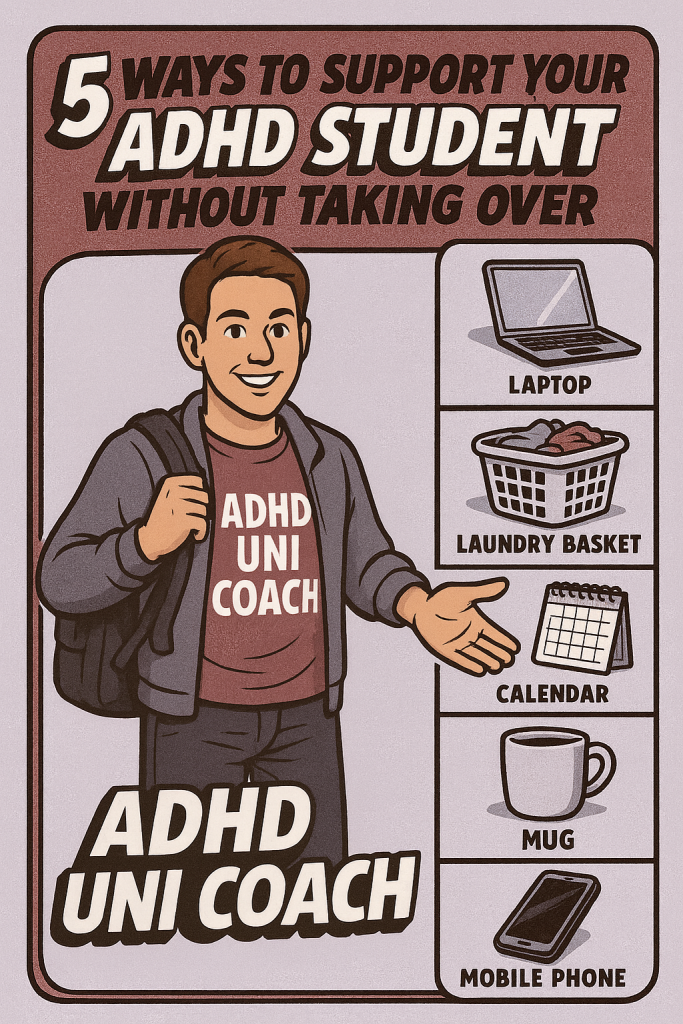🌅 5 Ways to Support Your ADHD Student Without Taking Over
Recently, I’ve had a lot of questions from parents whose children have just started university and moved into student accommodation. They’re excited for them, of course they are, but there’s also a fair bit of worry under the surface. “How do I support them without interfering?” “What if they’re overwhelmed and don’t tell me?” “Should I be doing something… or nothing?”
That push-pull is so familiar for parents of young adults with ADHD. They’ve spent years being the organiser, the reminder system, the motivator. Suddenly, their child is expected to manage everything on their own, often miles away, with only a pot noodle and a half-charged phone to keep them going.
So if you’ve invested in ADHD coaching for your young adult, you’re already doing something brilliant. Coaching can help build the self-awareness, structure and independence that many young people with ADHD need to thrive. But it also raises a tricky question for parents: how do I support them without stepping on their toes?
Here’s some guidance I often share with families, especially those navigating this shift for the first time.
✅ 1. Celebrate the small stuff
When your child calls to say they’ve finally done their laundry or emailed their tutor, resist the urge to say, “You should’ve done that days ago.” Instead, try something like, “That’s brilliant. I know that took effort.” ADHD brains respond well to specific, genuine praise. Small wins build trust and confidence.
✅ 2. Focus on strengths, not stumbles
It’s easy to zoom in on what’s going wrong, missed lectures, messy rooms, last-minute panics. But when you highlight what’s going well, you help your child see themselves through a different lens. Maybe they’ve shown creativity, perseverance or self-awareness. Point it out. They may not notice it unless you do.
✅ 3. Respect their boundaries
ADHD can make self-reflection and emotional openness tricky. Your child might not tell you much about how coaching is going, or how they’re feeling. That’s not a sign that it’s not working. Coaching is most effective when the young person feels ownership over the process. Giving them space can actually help them feel more in control.
✅ 4. Be the sounding board, not the sat-nav
Many people with ADHD process their thoughts by saying them out loud. You don’t have to offer solutions. Just listening, asking questions and staying curious can help them think things through. When a plan comes from them, rather than being handed to them, they’re more likely to follow through.
✅ 5. Step back, stay nearby
There’s a fine line between “letting go” and “staying available”. You don’t want to hover, but you also don’t want them to feel cut off. Let them know you’re around if they need to talk or bounce ideas around. Independence doesn’t mean doing everything alone.
🌟 Final thoughts
Sending a child to university is a big emotional leap. When ADHD is in the mix, it can be even more complex but also full of possibility. Your support, belief and gentle encouragement go a long way. Coaching works best when your young adult feels they’re in charge of their own journey, with you beside them rather than steering the wheel.
If you’d like to explore how coaching can support your child, or how you as a parent can adjust to this new chapter, click here to book your discovery call. I’m Michael, an ADHD coach based in the UK, and I work with adults and families in this very transition with warmth, honesty and absolutely no judgement.
See here for 5 Ways to Talk to Your Partner About Difficult Things
